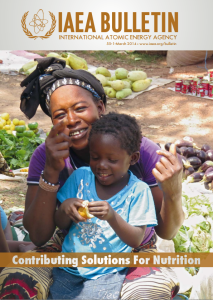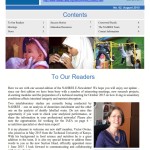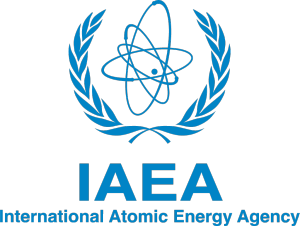New International Atomic Energy Agency inter-regional project, upcoming event and latest newsletter
IAEA Inter-Regional Project ‘Contributing to the evidence base to improve stunting reduction programmes’ Throughout 2015, the International Atomic Energy Agency (IAEA) is preparing a new inter-regional project on ‘Contributing to the evidence base to improve stunting reduction programmes’ covering Africa, Asia and Latin America. Stunting…
IAEA Inter-Regional Project ‘Contributing to the evidence base to improve stunting reduction programmes’
Throughout 2015, the International Atomic Energy Agency (IAEA) is preparing a new inter-regional project on ‘Contributing to the evidence base to improve stunting reduction programmes’ covering Africa, Asia and Latin America.
Stunting is caused by multiple factors ranging from household food insecurity and unhealthy environmental conditions to inadequate nutrition and a lack of access to health care. The IAEA is aiming to contribute its expertise in the use of stable isotopes to add value to current evaluation programs in low and middle income countries where children under 5 years of age suffer from stunting and its harmful long-term effects at the household, community and country levels.
Critical to the project is that countries are included that have a stunting problem, have ongoing or planned programmes that address stunting reduction and have a strong monitoring and evaluation component to which the project could add value.
The main stable isotope techniques that will be supported are:
- Breath test to assess the environmental enteropathy and any increase in nutrient absorption
- Breast feeding practices and the validity of the mother reports on the exclusivity of breastfeeding during the first 6 months of life
- Body composition as a proxy for the quality of the diet
Inclusion criteria for countries include: 1) stunting is a national problem; 2) there are current or planned national programs which can reduce stunting in children under 5 years of age; 3) the Ministry of Health is interested in evaluating the effectiveness of these programs; and finally 4) the availability of a local research institution or a laboratory led by a recognised team of researchers to carry out the add-on evaluation methods.
Read the attached brief for more information English | Français | Español
Technical Meeting “Environmental Enteric Dysfuntion, Microbiome and Undernutrition” 28 – 30 October 2015
In addition, a Technical Meeting on Environmental Enteric Dysfuntion (EED), Microbiome and Undernutrition will be organised by IAEA’s Nutitional and Health-Related Environmental Studies Section.
The event will be held at IAEA in Vienna, Austria from 28-30 October 2015.
This technical meeting will take place over the course of three days, 28-30 October 2015, and bring together experts working in the field of EED and experts knowledgeable in the application of stable isotope techniques in nutrition. The meeting will have the following objectives:
- Discuss current knowledge and gaps on the causes and consequences of EED
- Share experiences related to the implementation and evaluation of programmes to prevent and treat EED in infants, children, and adults
- Discuss technical issues and strategies related to the management of EED and undernutrition, including tests for diagnosis
- Identify knowledge gaps in the field of EED where the IAEA can add value by supporting the use of stable isotope techniques
Read more about the event: English
IAEA Bulletin “Contributing Solutions for Nutrition” 
Volume 55-1 IAEA Bulletin from March 2014 is focused on “Contributing Solutions for Nutrition”. The issue begins with an introductory word from Director General Yukiya Amano. The articles examine the IAEA’s contributions to nutrition programmes around the world with isotopic techniques, often through its Technical Cooperation programme with Member States or partnerships with international organizations. They share how IAEA helps Member States build and establish nutrition-oriented scientific capacities, and works with them to detect gastrointestinal bacterial infections, to assess breastfeeding practices or to reduce childhood obesity.
Download the Bulletin English | Français | Español | РУССКИЙ | العربية
IAEA Nutritional and Health-Related Environmental Studies Newsletter
The second edition of the IAEA Nutritional and Health-Related Environmental Studies (NAHRES) Newsletter is now available and begins with an introductory note from NAHRES Section head, Cornelia Loechl. The newsletter shares the latest information about recent meetings, new research projects, e-Learning modules and the preparation of a technical meeting for October 2015 on how living in unsanitary conditions affects intestinal integrity and nutrient absorption.
Download the NAHRES August Newsletter: English
Learn more about Nutrition and Health-Related Studies (NAHRES) at IAEA | Human Health Campus
